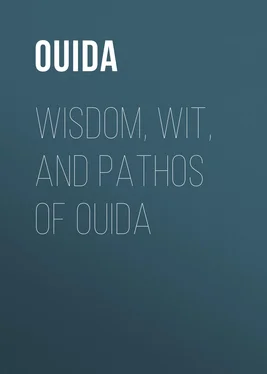Ouida - Wisdom, Wit, and Pathos of Ouida
Здесь есть возможность читать онлайн «Ouida - Wisdom, Wit, and Pathos of Ouida» — ознакомительный отрывок электронной книги совершенно бесплатно, а после прочтения отрывка купить полную версию. В некоторых случаях можно слушать аудио, скачать через торрент в формате fb2 и присутствует краткое содержание. Жанр: foreign_prose, literature_19, foreign_antique, на английском языке. Описание произведения, (предисловие) а так же отзывы посетителей доступны на портале библиотеки ЛибКат.
- Название:Wisdom, Wit, and Pathos of Ouida
- Автор:
- Жанр:
- Год:неизвестен
- ISBN:нет данных
- Рейтинг книги:4 / 5. Голосов: 1
-
Избранное:Добавить в избранное
- Отзывы:
-
Ваша оценка:
- 80
- 1
- 2
- 3
- 4
- 5
Wisdom, Wit, and Pathos of Ouida: краткое содержание, описание и аннотация
Предлагаем к чтению аннотацию, описание, краткое содержание или предисловие (зависит от того, что написал сам автор книги «Wisdom, Wit, and Pathos of Ouida»). Если вы не нашли необходимую информацию о книге — напишите в комментариях, мы постараемся отыскать её.
Wisdom, Wit, and Pathos of Ouida — читать онлайн ознакомительный отрывок
Ниже представлен текст книги, разбитый по страницам. Система сохранения места последней прочитанной страницы, позволяет с удобством читать онлайн бесплатно книгу «Wisdom, Wit, and Pathos of Ouida», без необходимости каждый раз заново искать на чём Вы остановились. Поставьте закладку, и сможете в любой момент перейти на страницу, на которой закончили чтение.
Интервал:
Закладка:
So the gods stood, and so they spoke, even to her; they seemed to her as brethren, masters, friends—these three immortals who looked down on her in their mute majesty.
They are the gods of the poor, of the wretched, of the outcast, of the proscribed,—they are the gods who respect not persons nor palaces,—who stay with the exile and flee from the king,—who leave the tyrant of a world to writhe in torment, and call a smile beautiful as the morning on the face of a beggar child,—who turn from the purple beds where wealth and lust and brutal power lie, and fill with purest visions the darkest hours of the loneliest nights, for genius and youth,—they are the gods of consolation and of compensation,—the gods of the exile, of the orphan, of the outcast, of the poet, of the prophet, of all whose bodies ache with the infinite pangs of famine, and whose hearts ache with the infinite woes of the world, of all who hunger with the body or the soul.
It became mid-April. It was market-day for all the country lying round that wondrous cathedral-spire, which shot into the air far-reaching and ethereal, like some fountain whose column of water had been arrested aloft and changed to ice.
The old quiet town was busy, with a rich sunshine shed upon it, in which the first yellow butterflies of the year had begun to dance.
It was high noon, and the highest tide of the market.
Flower-girls, fruit-girls, egg-sellers, poultry-hucksters, crowds of women, old and young, had jolted in on their docile asses, throned on their sheepskin saddles; and now, chattering and chaffering, drove fast their trade. On the steps of the cathedral boys with birds'-nests, knife-grinders making their little wheels fly, cobblers hammering, with boards across their knees, travelling pedlars with knapsacks full of toys and mirrors, and holy images, and strings of beads, sat side by side in amicable competition.
Here and there a priest passed, with his black robe and broad hat, like a dusky mushroom amongst a bed of many-hued gillyflowers. Here and there a soldier, all colour and glitter, showed like a gaudy red tulip in bloom amidst tufts of thyme.
The old wrinkled leathern awnings of the market-stalls glowed like copper in the brightness of noon. The red tiles of the houses edging the great square were gilded with yellow houseleeks. The little children ran hither and thither with big bunches of primroses or sheaves of blue wood-hyacinths, singing. The red and blue serges of the young girls' bodices were like the gay hues of the anemones in their baskets. The brown faces of the old dames under the white roofing of their headgear were like the russet faces of the home-kept apples which they had garnered through all the winter.
Everywhere in the shade of the flapping leather, and the darkness of the wooden porches, there were the tender blossoms of the field and forest, of the hedge and garden. The azure of the hyacinths, the pale saffron of the primroses, the cool hues of the meadow daffodils, the ruby eyes of the cultured jonquils, gleamed amongst wet rushes, grey herbs, and freshly budded leafage. Plovers' eggs nestled in moss-lined baskets; sheaves of velvet-coated wallflowers poured fragrance on the air; great plumes of lilac nodded on the wind, and amber feathers of laburnum waved above the homelier masses of mint and marjoram, and sage and chervil.
IDALIA
Whatever fate rose for them with the dawn, this night at least was theirs: there is no love like that which lives victorious even beneath the shadow of death: there is no joy like that which finds its paradise even amid the cruelty of pain, the fierce long struggle of despair.
Never is the voluptuous glory of the sun so deep, so rich, as when its last excess of light burns above the purple edge of the tempest-cloud that soars upward to cover and devour it.
"And we reign still!"
She turned, as she spoke, towards the western waters, where the sea-line of the Ægean lay, while in her eyes came the look of a royal pride and of a deathless love.
"Greece cannot die. No matter what the land be now, Greece— our Greece—must live for ever. Her language lives; the children of Europe learn it, even if they halt it in imperfect numbers. The greater the scholar, the humbler he still bends to learn the words of wisdom from her school. The poet comes to her for all his fairest myths, his noblest mysteries, his greatest masters. The sculptor looks at the broken fragments of her statues, and throws aside his calliope in despair before those matchless wrecks. From her soldiers learn how to die, and nations how to conquer and to keep their liberties. No deed of heroism is done but, to crown it, it is named parallel to hers. They write of love, and who forgets the Lesbian? They dream of freedom, and to reach it they remember Salamis. They talk of progress, and while they talk they sigh for all that they have lost in Academus. They seek truth, and while they seek, wearily long, as little children, to hear the golden speech of Socrates, that slave, and fisherman, and sailor, and stonemason, and date-seller were all once free to hear in her Agora. But for the light that shone from Greece in the breaking of the Renaissance, Europe would have perished in its Gothic darkness. They call her dead: she can never die while her life, her soul, her genius breathe fire into the new nations, and give their youth all of greatness and of grace that they can claim. Greece dead! She reigns in every poem written, in every art pursued, in every beauty treasured, in every liberty won, in every god-like life and godlike death, in your fresh lands, which, but for her, would be barbarian now."
Where she stood, with her eyes turned westward to the far-off snows of Cithæron and Mount Ida, and the shores which the bronze spear of Pallas Athene once guarded through the night and day, the dark light in her eyes deepened, and the flush of a superb pride was on her brow—it seemed Aspasia who lived again, and who remembered Pericles.
The chant of the Imaum rang up from the shore, deep and sonorous, calling on the Faithful to prayer, an hour before midnight. She listened dreamily to the echoes that seemed to linger among the dark foliage.
"I like those national calls to prayer," she said, as she leaned over the parapet, while the fire-flies glittered among the mass of leaves as the diamond sprays glistened in her hair. "The Ave Maria, the Vespers, the Imaum's chant, the salutation of the dawn or of the night, the hymn before sleep, or before the sun;—you have none of those in your chill islands? You have only weary rituals, and stuccoed churches, where the 'Pharisees for a pretence make long prayers!' As if that was not the best—the only—temple!"
She glanced upward at the star-studded sky, and on her face was that graver and gentler look which had come there when she sang.
"I have held it so many a time," he answered her, lying awake at night among the long grass of the Andes, or under the palms of the desert. It was a strange delusion to build shrines to the honour of God while there are still his own—the forests and the mountains.
"It was a fair heritage to lose through a feeble vanity—that beautiful Constantinople!" she said musingly. "The East and the West—what an empire! More than Alexander ever grasped at—what might not have been done with it? Asian faith and Oriental sublimity, with Roman power and Gothic force; if there had been a hand strong enough to weld all these together, what a world there might have been!"
"But to have done that would have been to attain the Impossible," he answered her. "Oil and flame, old and new, living and dying, tradition and scepticism, iconoclast and idolater, you cannot unite and harmonise these antagonisms?"
She gave a sign of dissent.
"The prophet or the hero unites all antagonisms, because he binds them all to his own genius. The Byzantine empire had none such; the nearest was Julian, but he believed less in himself than in the gods; the nearest after him was Belisarius—the fool of a courtesan, and he was but a good soldier; he was no teacher, no liberator, no leader for the nations. John Vatices came too late. A man must be his own convert before he can convert others. Zoroaster, Christ, Mahommed, Cromwell, Napoleon, believed intensely in their own missions; hence their influence on the peoples. How can we tell what Byzantium might have become under one mighty hand? It was torn in pieces among courtesans, and parasites, and Christian fanatics, and Houmousians and Houmoiousians! I have the blood of the Commneni in me. I think of it with shame when I remember what they might have been."
Читать дальшеИнтервал:
Закладка:
Похожие книги на «Wisdom, Wit, and Pathos of Ouida»
Представляем Вашему вниманию похожие книги на «Wisdom, Wit, and Pathos of Ouida» списком для выбора. Мы отобрали схожую по названию и смыслу литературу в надежде предоставить читателям больше вариантов отыскать новые, интересные, ещё непрочитанные произведения.
Обсуждение, отзывы о книге «Wisdom, Wit, and Pathos of Ouida» и просто собственные мнения читателей. Оставьте ваши комментарии, напишите, что Вы думаете о произведении, его смысле или главных героях. Укажите что конкретно понравилось, а что нет, и почему Вы так считаете.












